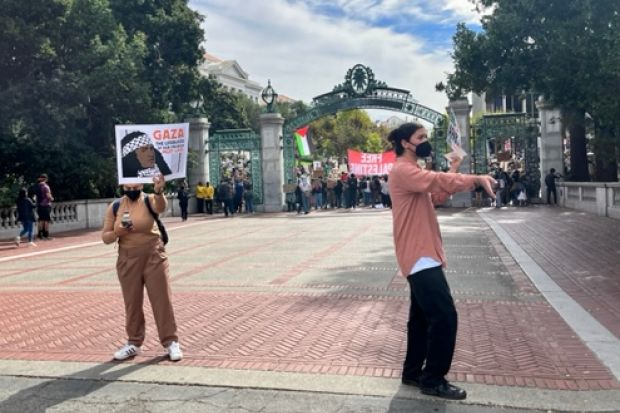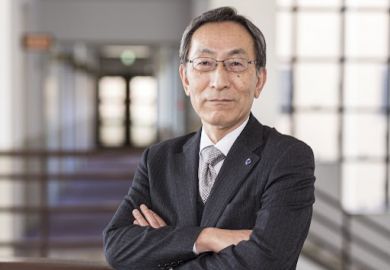US universities are facing direct economic threats over their alleged inadequacies in responding to the Israeli-Palestinian conflict, just as they were getting hit with a campaign of pressure to abstain from controversies deemed outside their parochial concerns.
In recent days, some donors have abandoned or threatened to quit supporting institutions that include Harvard University and the University of Pennsylvania over their responses – or, largely, the insufficiency of their responses – to the new surge of violence in Israel and Gaza.
That followed several companies rejecting or threatening not to hire US college students who had argued in public statements that Israel’s longstanding, internationally criticised treatment of the Palestinians played a role in the renewal of attacks against civilians on both sides.
Several prominent universities, including Harvard and Penn, responded with statements or modifications of statements to bring them more in alignment with pro-Israel donor demands, creating for their campuses a whole new set of controversies.
That all transpired shortly after several groups active on campus free-speech issues – based inside and outside of academia – began advising universities to generally avoid commenting on purportedly far-away matters of public policy that did not directly affect them.
Such promoters of institutional silence include a coalition of faculty calling itself the Academic Freedom Alliance, which has been suggesting a new set of guidelines for campus political debate called the Princeton Principles, and the independent group Fire, or Foundation for Individual Rights and Expression, which has just announced that it too believes that colleges and their leaders should show “institutional neutrality” on most public policy debates.
"When university administrators take sides on social and political issues,” said Alex Morey, an attorney who directs Fire’s campus rights advocacy department, “they put their thumb on the scale in a way that weakens conditions for free speech and scholarly inquiry on campus.”
Ms Morey insisted that universities in most cases could avoid giving a public accounting of their beliefs, even as the Israeli-Palestinian conflict made clear over the past week that the institutions and their students can face potentially serious financial and reputational involvement regardless of whether campuses do or do not issue statements on matters halfway around the world.
In response to questions about how universities should identify exceptions to her group’s keep-quiet advice, she acknowledged: “Those are going to be heavily fact-dependent analyses.”
The inescapability of how distant events can deeply affect US campuses has been most clear at Harvard. There, more than 30 student groups responded to the renewed violence by issuing a statement blaming Israel for maintaining decades of military control over Palestinian-majority territories.
That touched off a cascading series of pushbacks, counter-protests and threats. A former university president, Lawrence Summers, helped to start the cycle by condemning the student statement and demanding that Harvard’s new leader, Claudine Gay, do the same.
Then corporate chiefs led by venture capitalist William Ackman asked Harvard to publicly name the students who blamed Israel, saying they wanted to be sure never to hire them. The law firm Winston & Strawn said it was withdrawing a job offer to a New York University student who signed a similar statement.
Philanthropists Idan and Batia Ofer withdrew from the board of Harvard’s Kennedy School of Government. At Penn, billionaire private equity investor Marc Rowan said he would stop donating to the Philadelphia university, his alma mater. Lawyer and entrepreneur Vahan Gureghian said he would resign as a Penn trustee.
Professor Gay initially offered no public comment on the Israeli-Palestinian situation. She then tried to call for students to understand the harms felt on both sides of the conflict, before eventually faulting the Palestinian extremist group Hamas for initiating the latest violence. Penn’s president, Elizabeth Magill, said she could have done more to show sympathy toward the Jewish community.
That didn’t stop the vitriol. Around Harvard’s campus, the conservative activist group Accuracy in Media began driving a rented truck through the streets of Cambridge displaying names and photos of students that it believed to have endorsed the statement backing the Palestinians, calling them “Harvard’s leading antisemites”. Some Harvard students noted that those pictured disproportionately involved darker-skinned backers of the statement.
The antagonisms got backing as high up as the US Congress. “Companies are right not to tolerate antisemitism and are well within their rights to refuse to employ antisemites,” the Republican chair of the education committee in the US House of Representatives, Virginia Foxx, told Times Higher Education. “Welcome to the real world, where actions have consequences.”
Yet even Jewish students and leaders at Harvard did not welcome the tactics. Members of the Harvard Hillel pleaded, unsuccessfully, with the Accuracy in Media group to stop the truck, calling it “public intimidation” that was hindering constructive discussion.
Professor Summers, also Jewish, reiterated his condemnation of the student statement but called for an end to attempts to punish them through public shaming and job denials. “This is not a time where it is constructive to vilify individuals, and I am sorry that is happening,” he said in a social media posting.
Many students at Penn also remained dissatisfied with Professor Magill’s handling of the matter, walking out of their classes to support Palestinians and protest their president.
The threats to students and donations nevertheless have been having their effect. The pushback – along with polling data showing that Americans tend to take the side of Israel – prompted campus presidents beyond Harvard and Penn, including those at NYU and Cornell, to update their statements on the conflict to be more critical of the Palestinian position. Some Harvard students and groups associated with the pro-Palestinian statement withdrew their names from it.
And while some conservative activists have begun urging universities not to make public comments on national and global concerns, a leading conservative politician now heading a large US university – Ben Sasse at the University of Florida – went in the other direction.
In an email addressed to “Jewish Gator Alums”, the former US senator said he would “not tiptoe around this simple fact”, that Israel was not to blame for the violence against it by Palestinians.
A University of Florida spokeswoman said the president did not write to any non-Jewish groups about the violence, and said the university did not keep track of whether or how many Palestinian students it might have.




